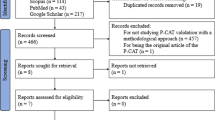
Overview
- Includes a comprehensive range of topics spanning policy, clinical practice, methodology, and theory
- Argues that stakeholder interests are better advanced via metrological networks than across disconnected silos
- Articulates metrology's pragmatic integration of local particulars and abstract ideals in distributed networks
- This book is open access, which means that you have free and unlimited access
Part of the book series: Springer Series in Measurement Science and Technology (SSMST)
Buy print copy
Tax calculation will be finalised at checkout
About this book
This unique collection of chapters from world experts on person-centered outcome (PCO) measures addresses the following critical questions: Can individual experiences be represented in measurements that do not reduce unique differences to meaningless uniformity? How person-centric are PCO measures? Are PCO measurements capable of delivering the kind of quality assured quantification required for high-stakes decision making? Are PCO measures likely to support improved health care delivery? Have pivotal clinical studies failed to deliver treatments for diseases because of shortcomings in the PCO measures used? Are these shortcomings primarily matters of precision and meaningfulness? Or is the lack of common languages for communicating outcomes also debilitating to quality improvement, research, and the health care economy? Three key issues form an urgent basis for further investigation. First, the numbers generated by PCO measures are increasingly used as the central dependent variables upon which high stakes decisions are made. The rising profile of PCO measures places new demands for higher quality information from scale and test construction, evaluation, selection, and interpretation. Second, PCO measurement science has well-established lessons to be learned from those who have built and established the science over many decades. Finally, the goal in making a PCO measurement is to inform outcome management. As such, it is vitally important that key stakeholders understand that, over the last half century, developments in psychometrics have refocused measurement on illuminating clinically important individual differences in the context of widely reproduced patterns of variation in health and functioning, comparable scale values for quality improvement, and practical explanatory models.
This book’s audience includes anyone interested in person-centered care, including healthcare researchers and practitioners, policy makers, pharmaceutical industry representatives, clinicians, patient advocates, and metrologists.
This is an open access book.
Similar content being viewed by others
Keywords
Table of contents (12 chapters)
-
Front Matter
-
Back Matter
Editors and Affiliations
About the editors
Stefan J. Cano: Stefan is a Chartered Psychologist and Associate Fellow of the British Psychological Society. He has 25 years’ experience in person-centered outcome instrument development and psychometric research. He initially studied Psychology at University College London, UK, and later completed a PhD in Health Services Research at the London School of Hygiene & Tropical Medicine, UK, before undertaking post-doctoral research at the University College London Institute of Neurology, UK. Having previously worked extensively in qualitative and quantitative research projects, Stefan’s main area of interest is in developing, applying, and improving mixed methods psychometric research in clinical studies and therapeutic trials. Stefan previously sat on the ISOQOL Board of Directors and was co-chair of the 17th Annual Conference in 2010.
Bibliographic Information
Book Title: Person-Centered Outcome Metrology
Book Subtitle: Principles and Applications for High Stakes Decision Making
Editors: William P. Fisher, Jr., Stefan J. Cano
Series Title: Springer Series in Measurement Science and Technology
DOI: https://doi.org/10.1007/978-3-031-07465-3
Publisher: Springer Cham
eBook Packages: Physics and Astronomy, Physics and Astronomy (R0)
Copyright Information: The Editor(s) (if applicable) and The Author(s) 2023
Hardcover ISBN: 978-3-031-07464-6Published: 03 December 2022
Softcover ISBN: 978-3-031-07467-7Published: 20 September 2023
eBook ISBN: 978-3-031-07465-3Published: 02 December 2022
Series ISSN: 2198-7807
Series E-ISSN: 2198-7815
Edition Number: 1
Number of Pages: XII, 402
Number of Illustrations: 17 b/w illustrations, 71 illustrations in colour
Topics: Measurement Science and Instrumentation, Health Informatics, Psychometrics, Health Administration



